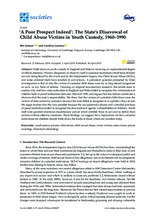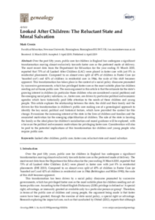Displaying 461 - 470 of 1482
Drawing on original documentary research, this article aims to explain why and how state authorities in England and Wales failed to recognise the victimisation of children held in penal institutions between 1960 and 1990, and argues that this failure constitutes a disavowal of the state’s responsibility.
This article examines the tension between the rhetoric of children’s rights and the realities of residential care for children in Taiwan.
This study was based on a random cluster sample of 1409 youth, aged 13 to 20, in Israeli educational residential care settings (RCSs) designed for youth from underprivileged backgrounds.
This country care review includes the care-related Concluding Observations adopted by the Committee on the Rights of the Child and the Committee on the Rights of Persons with Disabilities.
This country care review includes the care-related Concluding Observations adopted by the Committee on the Rights of Persons with Disabilities.
In this article, the authors provide children’s insights into their own life experiences and individual identities. The data was collected during an ethnographic research in one of Estonia’s SOS Children’s Villages (SOS CV).
The main argument in this article is that the rationale for the state’s growing interest in children (in particular those children who are considered a social problem) and the emerging social policy solutions, i.e., foster care, are driven by particular political and economic agendas which have historically paid little attention to the needs of these children and young people.
This study investigated the relationship between familial residential school system (RSS) exposure and personal child welfare system (CWS) involvement among young people who use drugs (PWUD).
This theoretical-empirical study is based on two particular case studies of families bringing up children from institutional care in Slovakia.
This video from 1MillionHome shares the story of one children's home in Kenya, Agape, that transitioned from a "traditional orphanage" to a family reunification center.




